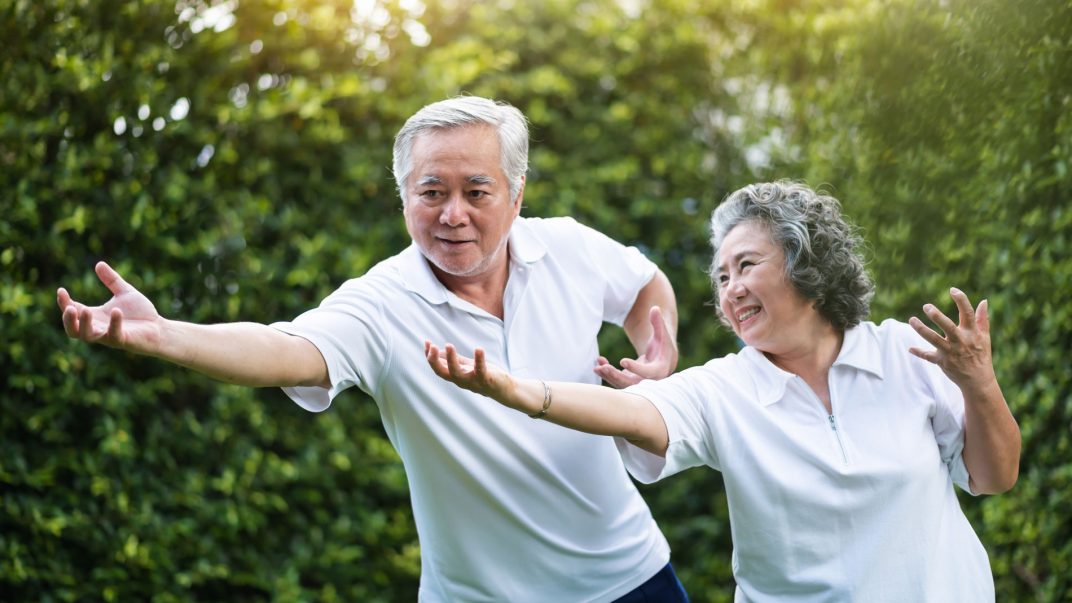Can traditional Chinese exercises boost our mental health?


- Within Canada and across the world, depression and anxiety are two of the most common mental disorders.
- The effects of depression and anxiety are wide reaching, impacting everything from personal relationships to the ability to engage in essential activities of daily living.
- Traditional Chinese exercises, like Tai Chi and Qigong, may reduce symptoms of depression and anxiety in older adults.
- Speak with your healthcare team about all available treatment options for depression and anxiety, including exercise, medications, and psychological therapies, to develop a comprehensive and tailored treatment plan.
Did you know that by the age of 40, half of Canadians will have a mental illness or will have previously experienced a mental illness (1)? Depression and anxiety are two of the most common mental disorders, both globally and right here at home (2-4). While we may hear about them and their statistics often, it’s also important to consider the magnitude of their impacts. From routine activities like completing household chores to hobbies and personal relationships that fulfill us, depression and anxiety can affect many areas of our day-to-day lives.
What can this look like? Take, for example, depression. A person is entering their second week of battling daily feelings of sadness and emptiness. At night, they have trouble sleeping and during the day their energy and motivation are low. As this depressive episode continues, the dishes and laundry pile up, but they find themselves unable to tackle these chores. Then we have anxiety. A person has a friend’s 65th birthday party to attend, but they’re dealing with persistent and intense worry and irritability and are having a hard time concentrating. They end up skipping the gathering to avoid feeling more anxious, adding it to the list of social events they’ve missed over the past month (2;3). While these are just two specific scenarios and highlight only some of the symptoms that people living with depression or anxiety may experience, they help demonstrate how quality of life can be negatively impacted by these disorders and why it’s necessary to be aware of options for treatment.
Over the years, exercise has emerged as a popular strategy to manage depression and anxiety (4). But as we know, there is no shortage of exercise types! Under this large exercise umbrella, low-intensity traditional Chinese exercises are garnering interest among researchers. These forms of exercise incorporate deep breathing, meditation, and slow movements (4-6). Let’s dig deeper into their effects on symptoms of depression and anxiety in older adults with the help of a recent systematic review(4).
What the research tells us
The review focused on two types of traditional Chinese exercises—Tai Chi and Qigong. Ultimately, it found that traditional Chinese exercises may reduce symptoms of depression and anxiety in older adults. However, effectiveness can vary based on the characteristics of the exercise routine or program. So, what’s ideal?
Well, to see optimal effects on depressive symptoms, older adults may need to take part in traditional Chinese exercises 5-7 times a week for a period greater than 24 weeks. However, when it comes to symptoms of anxiety, it appears you can get away with slightly less. More specifically, older adults may need to only take part in traditional Chinese exercises 3-4 times a week over a 12-16 week period to experience optimal anxiety-related benefits. Finally, you may be wondering how long each individual exercise session should be to achieve results. The answer is 40-60 minutes in length for both depression and anxiety (4).
Are you or a loved one dealing with depression or anxiety? Speak with your healthcare team about available treatment options, including medications, psychological treatments, and exercise. Together, you can weigh the risks and benefits of each strategy and develop a tailored plan that includes one or more components and the most beneficial doses, frequencies, and durations. The Government of Canada also offers links to mental health supports across the country. But if you’re experiencing a crisis and need immediate medical assistance, call 9-1-1.
References
- The Centre for Addiction and Mental Health. Mental illness and addiction: Facts and statistics. Internet] n.d. [cited August 2025]. Available from: https://www.camh.ca/en/driving-change/the-crisis-is-real/mental-health-statistics
- World Health Organization. Depressive disorder (depression). [Internet] 2025. [cited August 2025]. Available from: https://www.who.int/news-room/fact-sheets/detail/depression
- World Health Organization. Anxiety disorders. [Internet] 2023. [cited August 2025]. Available from: https://www.who.int/news-room/fact-sheets/detail/anxiety-disorders
- Dong Y, Pang D, Xiang J, et al. Exploring the benefits of traditional Chinese exercises (Tai Chi and Qigong) on the anxiety and depression of older adults: A systematic review and meta-analysis. Medicine. 2025; 104(12).
- Lan C, Chen S-Y, Lai J-S, Wong AM. Tai Chi Chuan in medicine and health promotion. Evid Based Complement Alternat Med. 2013; 2013:502131.
- Koh TC. Qigong–Chinese breathing exercise. Am J Chin Med. 1982; 10:86-91.
McMaster Optimal Aging Blog Posts are written by faculty, staff, PhD students, and external collaborators, and are assessed for accuracy by members of the Portal scientific leadership team.
DISCLAIMER: These summaries are provided for informational purposes only. They are not a substitute for advice from your own health care professional. The summaries may be reproduced for not-for-profit educational purposes only. Any other uses must be approved by the McMaster Optimal Aging Portal (info@mcmasteroptimalaging.org)